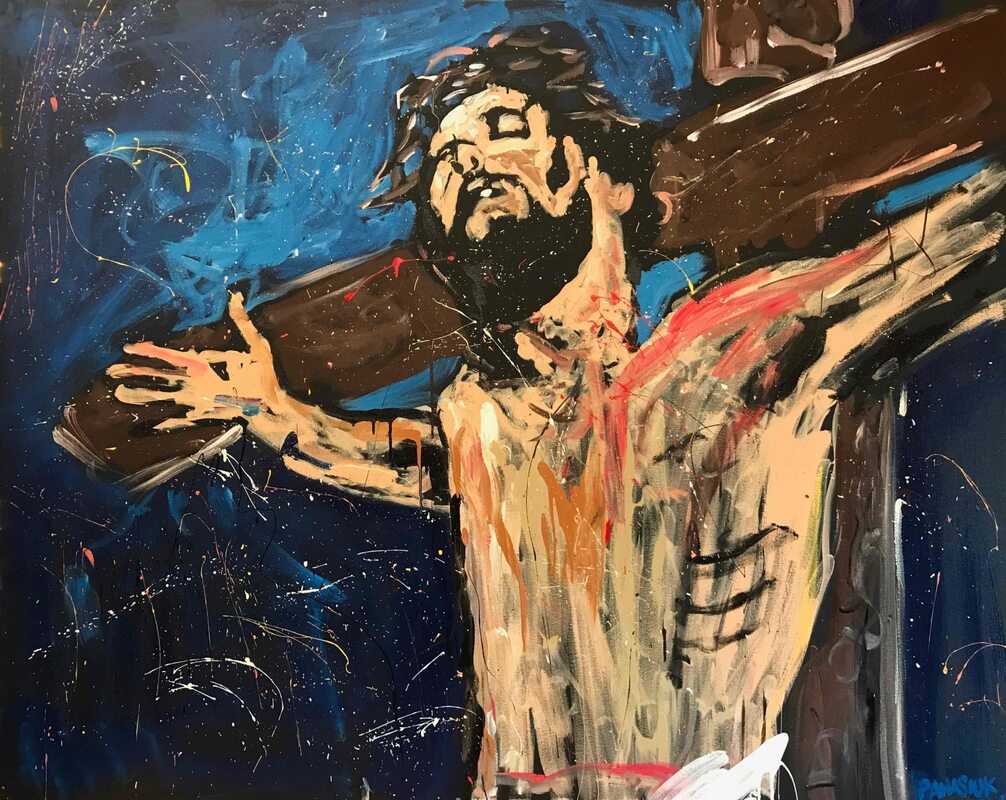For parents who are working from home and having to juggle the responsibilities for caring for and homeschooling their children, life is almost unmanageable. Contrast that with those who live alone and haven’t felt human touch now for weeks. Then there are the high school students who won’t have a senior prom or graduation, the college students who have been forced home in isolation from the community of their dorm life, and all the students and teachers now relegated to the confounding and sterile world of online learning. Yes, it is disruptive to say the least.
And all this is overshadowed by those ravaged by the coronavirus – those who are struggling for their very breath, the grieving families forced to be apart from their loved ones, and the healthcare workers who are overwhelmed with anguish as they hold hand after hand of those passing from this life to the next. Lord, have mercy. Christ, have mercy on us. The collective grief is heavy and palpable in the air.
Which seems fitting, because today begins the Triduum of Holy Week where we enter into the grief of Jesus’ passion, crucifixion, and death. Here we find Jesus just hours away from his betrayal that will begin the arduous journey to the cross. And we find Jesus troubled, distressed, and heartbroken. Sometimes, we forget that Jesus was human just like you and me. For we see a Jesus full of grief and wrestling as he tarries and groans in the Garden of Gethsemane. Buckling under the weight of all that is coming – the impending betrayal and abandonment of those closest to him; the agony, humiliation and injustice of the cross; and a magnitude of suffering of which few can fully fathom.
So how in Jesus’ humanity did he endure this? I mean, really. We are hard pressed here in our own versions of COVID misery-and-suffering, but how is this possible?
I believe it is because he knew “the secret”. Far from creating his own reality or self-actualizing, Jesus chose to lay his life down. He didn’t simply endure suffering, but he consented to it. This is the confounding, upside-down gospel that says, “Whoever seeks to gain their life will lose it, but whoever loses their life will preserve it.” [Luke 17:33]
Steeped in a culture that avoids suffering at all cost, we are prone to fight and rail against difficulty in our lives. And yet the mystic saints would say that the path to finding interior freedom regardless of external circumstances is through acceptance and consent. Consenting to that which we did not choose. Trusting that the God who is able to draw good out of whatever befalls us will do so.
Etty Hillesum, a young Jewish woman who died in Auschwitz in 1943 learned this “secret” in the midst of great suffering. She wrote, “I now realize, God, how much You have given me. So much that was beautiful and so much that was hard to bear. Yet whenever I showed myself ready to bear it, the hard was directly transformed into the beautiful.” [An Interrupted Life: The Diaries and Letters of Etty Hillesum]
For the most painful suffering is the suffering we reject — and what really hurts is not so much suffering itself as the fear of suffering. While it seems counterintuitive, when we embrace our suffering, we open ourselves up to the beauty of transformation and new life. Now I get it. Acceptance doesn’t happen overnight, but we can begin to shift our hearts and our minds towards this work of the Spirit. It’s a process — through the resistance, rebellion, and resignation to acceptance and finally consent.
We have been taught that our happiness and freedom is about our ability to seek our own pleasure, choosing what suits us best from a wide variety of possibilities. And yet, we currently are experiencing that there is much in life we do not choose. In fact, we have far less control than we think. We are now experiencing just a taste of what those who experience oppression, illness, poverty and injustice know far too well. As our lives are now being constrained, our freedom narrowed, and our choices limited, there is a deeper truth. True freedom is consenting to what we did not originally choose. It is choosing the humble way of trust and surrender.
Jesus said, “No one takes my life from me, but I lay it down of my own accord.” [John 10:17]
Here is a paradox. His life was certainly taken from him; he was put in chains, condemned, led to Calvary, and crucified. But, as the liturgy says this was a “death he freely accepted.” In his heart was deep acceptance of what His Father wanted. Jesus remained supremely free in his death, because he made it into an offering of love. By his free and loving consent, the life that was taken became a life given. [Jacques Philippe, Interior Freedom]
As we journey through Holy Week facing the difficulties of restraint and quarantine, how can we surrender our grief, loneliness, anger, sadness and fear? How does our life taken become a life given? And what beauty awaits us as we find the deep place of freedom within that no external power can take away?
This is the mystery of the cross, the paradoxical “secret” of the gospel — that nothing can separate us from the love of God. When all else is gone, faith, hope and love remain, and the greatest of these is love. [I Corinthians 13:13] So let us accompany Jesus to the cross, laying down our lives in surrender, knowing that in the end, we are surrendering to love. And love wins every single time.
by Jessica Ketola
***To enter into Holy Week, we are providing you a liturgy for Stations on the Street.

 RSS Feed
RSS Feed
